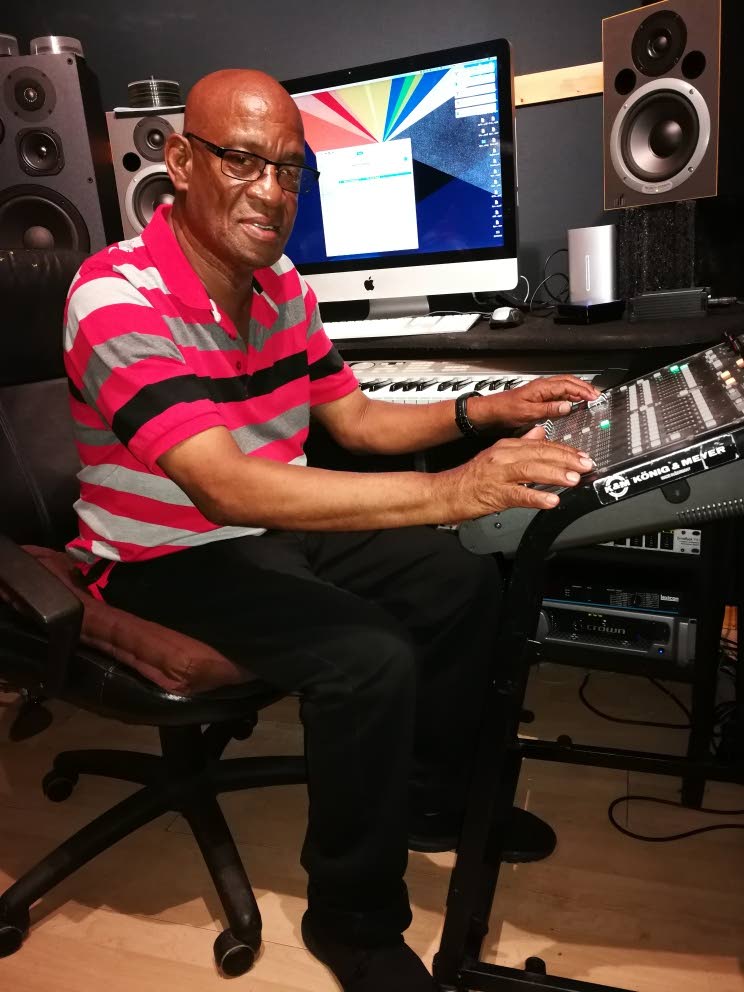'I've paid my dues'

Ace musician Pelham Goddard said when he was told he would be conferred with an honorary doctorate from the University of the West Indies' St Augustine campus, he felt very happy.
With a gleam in his eye and joy on his face, PG, as he is fondly called, said: “I feel honoured because sometimes people feel that musicians aren’t recognised. So any time a musician or artiste gets something of that nature you feel great about it.”
The master keyboardist said with a big laugh: “Some people are calling me heckling me, telling me, 'Doc! Doc! I have a pain here.' But people seem to be happy for me because they know I have been playing music for so long.”
Goddard started playing music with bands from 1967, but before that he played in schools, church and community concerts.
“For well over 65 years I have been playing, so that is more than paying dues.”
Asked about the volume of his work to date, PG said: “I never did a count of the amount of songs I worked on or produced, but it is a lot. When you consider I worked with Ed Watson, Art de Coteau, Earl Rodney, Clive Bradley, on songs that were hits like Sugar Bum Bum (Kitchener), La La (Nelson), Bassman (Shadow), Woman on the Bass (Scrunter) and with Roots and David Rudder and Chris 'Tambu' Herbert and Austin 'SuperBlue' Lyons, it is a lot.”
Goddard first played with the Pete de Vlaught orchestra in the sixties, then went on to The Clan, The Flames, Esquires Brass band and Sensational Roots.
“In 1972, I went to St Thomas with a whole plane full of calypsonians and played for all of them.
"After that, all they want is Pelham in the recording studio with them,” said Goddard with a grin.
Four years after the Berklee College of Music graduate got into pan music, he started arranging for Third World Steel Orchestra. The steelband’s version of Goddard’s arrangement of Gold and American Patrol remain among pan aficionados’ all-time classics.
But long before that, Goddard was one of many musicians experimenting with sounds and music at the now defunct KH Studios, where soca was birthed.
He recalled: “To me, I think soca was a collaborative effort where people were working to do different things, and Shorty (Garfield Blackman) is the one that came up with the name.
"But at that time there was Bradley with Party on the Block, Nappy Myers, Pelham and Sensational Roots and Maestro (Cecil Hume) all doing things in that KH Studio.”
He also spoke of the contributions of the musicians who played with Shorty, like Michael Tobias (drummer), Angus Nunes (who also went on to play bass with Harry Belafonte), Johnny Black (guitar), Vonrick Maynard (drums), Junior Wharwood (guitar), Eldon Warner and Clarence Ross.
The first big soca song according to PG, was Lord Shorty’s Endless Vibrations in 1974, then Maestro’s Fiery and Tempo 1976, all of which PG worked on. As a matter of fact he has worked with every major artiste in TT.
His own composition started with Calypso Zess, then Just Give Me Love, sung by Hazel Rambaransingh with Sensational Roots.
Subsequent to that came a flurry of songs like Jungle Fever, Callaloo, Calabash, Panama, Dedication, Jump Up, and for the steelband, after Goddard became the arranger for Exodus, Savannah Party, Dust in Yuh Face, The Hammer, A Happy Song, Play My Music, Simple Thing, Parade, Puna Band, The Band Plays On, Good News and We Jammin Again.
But it is Goddard’s stellar work in producing Carnival road march winners that is unmatched to date. Beginning in 1977 with Tempo (Calypso Rose), his next 11 road marches were Soca Jam (Calypso Rose), Soca Baptist, Ethel and Rebecca (Blue Boy), Bahia Girl (David Rudder), This Party Is It, Free Up and No No, We Eh Going Home (Tambu), and Get Something and Wave, Wine on Something and Bacchanal Time (SuperBlue).
Goddard said: “It would have been 13, but there was a problem. I couldn’t go with SuperBlue to record Lara at Eddy Grant's studio in Barbados. But I did the track and gave them the diskett to take to Barbados.”
PG was also the first musician to use the synthesiser in calypso music, when he soloed with it on Woman On The Bass.
He now has his own recording studio, Agra 9 Production Studio. Goddard said: “I want to continue producing good music and I want to keep a standard with the calypso.
“I told artistes that the way how calypso is now, artistes don’t give the audience anything to sing. No chorus, no melody, no nothing. And we need brass!
"While the young people like the technology, I want to see if I could guide them into something that they could keep the culture going in a correct way.”
Goddard will soon be releasing his latest production, Spanish Mister, done salsa style, in response to Baron’s Spanish Woman. It is sung by Candice Antoine.
This release is among several Christmas music covers PG has done over the years like his Pelham’s Christmas Classics.
As to what he expects at the UWI graduation ceremony next month, Goddard said: “I told them I want to play my song Dedication after I get the award, because you have to be dedicated to stay in this business.”
Also committed to play with Exodus at the Big 5 concert on the same day, he said gleefully: “When I’m done with that, I will be going to the Queen’s Park Savannah to celebrate at Big 5. The children will be coming home for the occasion, Gerard (son), Michelle (daughter), my sister Marlene – everybody will be partying in the Savannah with a cooler, some savannah brass on the savannah grass.”
Goddard, who turns 73 in December, received a Hummingbird Silver Medal in 1994.


Comments
"'I've paid my dues'"